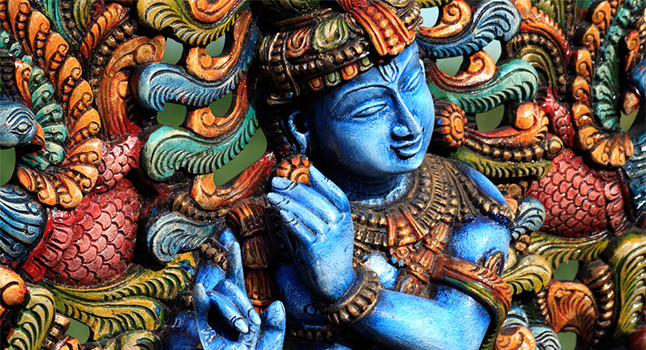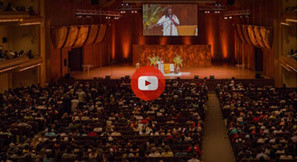
India would not be India if you take away Lord Krishna and the epics of Ramayana and Mahabharata. These epics are like the two eyes of our country. They are not related to just one religion or school of thought. They are deeply connected with our entire culture and heritage.
Ramayana and Mahabharata are read and discussed in every village of our country. The speciality of these epics are that they are not limited to a particular time. These epics are alive and are happening even now. There is a Mahabharata happening every day, in everyone’s lives. There is a discourse from the Gita that is coming true every day!
Janmashtami is the day when we celebrate the birth of Lord Krishna
Lord Krishna signifies Ananda (bliss, pure happiness). So Janmashtami is celebrating the birth of bliss. It is the day when joy became manifest.
Actually, it is not right to use the word ‘birth’ here. Lord Krishna was never born. That divine joy was always present, but it is on this day that it became manifest and evident (in the form of Lord Krishna). You should look at Lord Krishna’s birth from a more spiritual point of view.
The hidden symbolism behind the story of the birth of Lord Krishna
Devaki (Lord Krishna’s mother) represents the physical body, while Vasudeva (Lord Krishna’s father) represents the Prana (the vital life-force). When prana rises in the body, joy (Krishna) is born. That's why Krishna is called Nandalala – one who is the embodiment of bliss. Within this small body you are able to experience the infinite space (through spiritual practices).
Kamsa represents the ego. Kamsa is Devaki’s brother which indicates that the ego is born along with the body. The biggest adversary of ego is joy. Ego cannot survive and has to bow down where there is joy and love. A person can hold a very high position in society, but he melts in front of his own little child. When the child falls ill, however strong the person is, he feels a little helpless. Ego simply melts when confronted with love, simplicity and joy. This is why there is a war between ego (Kamsa) and love. Krishna is the epitome of joy, the quintessence of simplicity and the very source of love.
As the story goes, when Krishna was born, the prison guards fell asleep. The guards here represent the five senses which protect the ego because they are turned outward when awake.
When there is no happiness and joy (Lord Krishna), the body feels like a prison. When Lord Krishna (joy) was born in this prison (body), all the senses (symbolized by the prison guards) fell asleep. The five senses – the eyes, ears, nose, tongue and skin – are the guards of the ego that keep you so engaged on the outside so that you don't see the infinite sky within. When one turns inwards towards the source of joy, bliss is born within, that is, Lord Krishna.
Lord Krishna and the Mother Divine were both born on the same day of Ashtami (also a day of special significance during the Navratri celebrations). The Mother Divine took a physical form, but when the evil King Kamsa tried to grab hold of her, She freed Herself from Kamsa’s hands and disappeared into the skies. The essence here is that the ego cannot capture Shakti – the Divine energy (represented here by the Mother Divine). It may appear that the ego can trap Shakti, but it is not so.
Ego can neither capture bliss (represented by Lord Krishna), nor can it capture Shakti. This is the message of Janmashtami.
Connecting to Lord Krishna
So where should you look for Lord Krishna? Everywhere!
Lord Krishna says, ‘One who sees Me everywhere, in everyone, and sees everyone in Me is truly intelligent’. Everything has emerged from one divinity – this is the special message of Janmashtami.
You can realize Lord Krishna only through deep rest. You cannot realize Lord Krishna through struggle and effort. And when can you get that deep rest? Deep rest happens when your mind is not restless and entangled with feverish desires; when it is not caught up in cravings and aversions. It is in those moments of deep rest that one witnesses the birth of Lord Krishna (here meaning the feeling of bliss).

Subscribe
If you enjoyed reading this content and would like to receive a notification on our future updates, you can subscribe here.
You can also write to us on webteam.wisdom@artofliving.org for any questions or comments.

Significance of Janmashtami
Janmashtami assumes great significance for devotees because on this day you remember all the qualities that Krishna came
to manifest.
So, what is the best way to
celebrate Janmashtami?
In this article, Gurudev Sri Sri Ravi Shankar talks about the essence of Janmashtami and the best way to celebrate it.



























